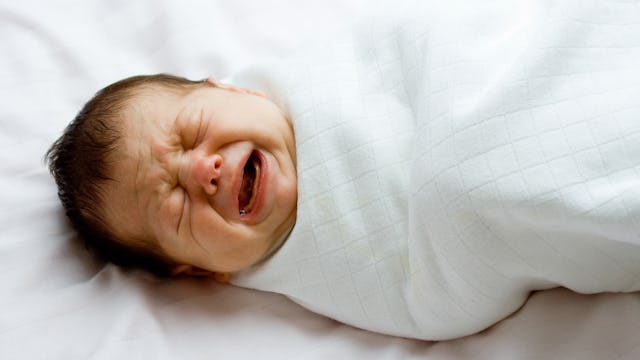Most Obvious Study Ever Says Parenting A Fussy Baby Is More Draining

A new study confirms that parenting a fussy baby is more stressful and can cause more symptoms of depression than an “easy” baby
A new study from Academic Pediatrics, which drew its conclusions from data collected from more than 8,200 women and their babies at nine months postpartum, found something pretty distressing — if totally obviously. Moms with fussy babies, born full-term, were about TWICE as likely to note moderate to severe depressive symptoms as compared to moms with “easy” babies.
The study also examined moms of babies born prematurely and found similar results, though to different degrees for babies born between 24 and 31 weeks of gestation and those born between 32 and 36 weeks. The moms of the later-born preemies had twice the odds of moderate to severe depression symptoms while moms of very premature babies had the same odds, only for mild depressive symptoms.
The study’s senior author, Dr. Prachi Shah, a developmental and behavioral pediatrician at U-M C.S. Mott Children’s Hospital in Ann Arbor, Michigan, says we need to note a few things from the results of the team’s research. Namely, that doctors and pediatricians need to understand the mental health risks for parents of fussy babies. “A mother who has a fussier, less-soothable infant can have lower self-confidence, feelings of lower efficacy, feeling more depressed and more stressed,” Shah says.
Well yeah, of course. While it’s nice to hear Science understanding our pain, it’s a pretty big “no duh” that a fussy baby can stress a mother out. Seeing those other moms with the always-happy babies at playdates can feel like a total gut-punch to a mom whose baby never seems content.
Part of the problem stems from when the crying and fussiness has no clear cause, such as colick or gassiness. It’s easy for a parent to blame themselves when there’s no fixable and obvious reason for their baby’s frequent unhappiness. That can lead to feeling depressed and hopeless.
An interesting conclusion drawn by Shah based on the results involves the “mild” depression stats from parents of very premature babies. The researcher feels that might be because parents with babies born that early tend to spend a lot more time with healthcare providers, which can mean they got greater postpartum mental health support. Shah says it’s crucial for doctors to take parents seriously if they present with a fussy baby. “If a parent brings this issue to a pediatrician, I think it’s important to normalize it to a certain degree — to say many parents have infants who are fussy — but also to recognize that this is a challenge, and that we should not minimize it,” they explain.
My first baby was my easy baby. I’ve long said I had no plans to become a member of the “2 under 2” club until I had her and figured I must be friggin’ amazing at this parenting thing, because aside from some garden-variety gassiness before bedtime, she was easy as can be. Always smiling, slept 8-hour stretches starting at a month old (and 6-hour stretches from her first week), rarely had a problem I couldn’t solve in a matter of minutes, and always had a clear reason for her upset moments.
Then came my Humble Baby, as I call him.
Everything I thought I knew about being a mom was pretty much useless when it came to caring for my son. Nothing worked. Nothing that made his sister happy made him happy. Honestly, nursing was all that made him happy — and the poor nugget suffered from milk protein and soy intolerances, so even eating made his life more miserable. I spent his entire first year exhausted, strung out, constantly questioning my skills and worth as a mom, and wondering why on earth I ever thought I should have a baby while still parenting a toddler.
Looking back, if my son’s pediatrician had noticed my tired eyes and listened very hard when I explained over and over that he is truly inconsolable much of the time, I might have fared better. Someone could’ve helped me understand that it wasn’t my fault and I was doing the best I could. Fortunately, I didn’t experience PPD after his birth, but I was a constantly self-doubting (and zombie-exhausted) mess. It would’ve be nice to know that it’s totally normal to feel so drained by such a tiny, tough-to-please human.
Even though the results of this study seem completely obvious, it is heartening to feel heard. I recall being blown off by family, friends, and even fellow moms when I told them how hard it was parenting a baby who was fussy all the time. Plenty of people who haven’t been there (or who have, but it was so long ago they forgot — ahem, Grandma) truly don’t understand how draining it is to care for a baby who is rarely happy.
“Asking about their babies’ temperament and fussiness,” Shah says, “should be an important part of our postnatal care.”
Every exhausted parent or a fussy baby everywhere would agree 100 percent.
This article was originally published on